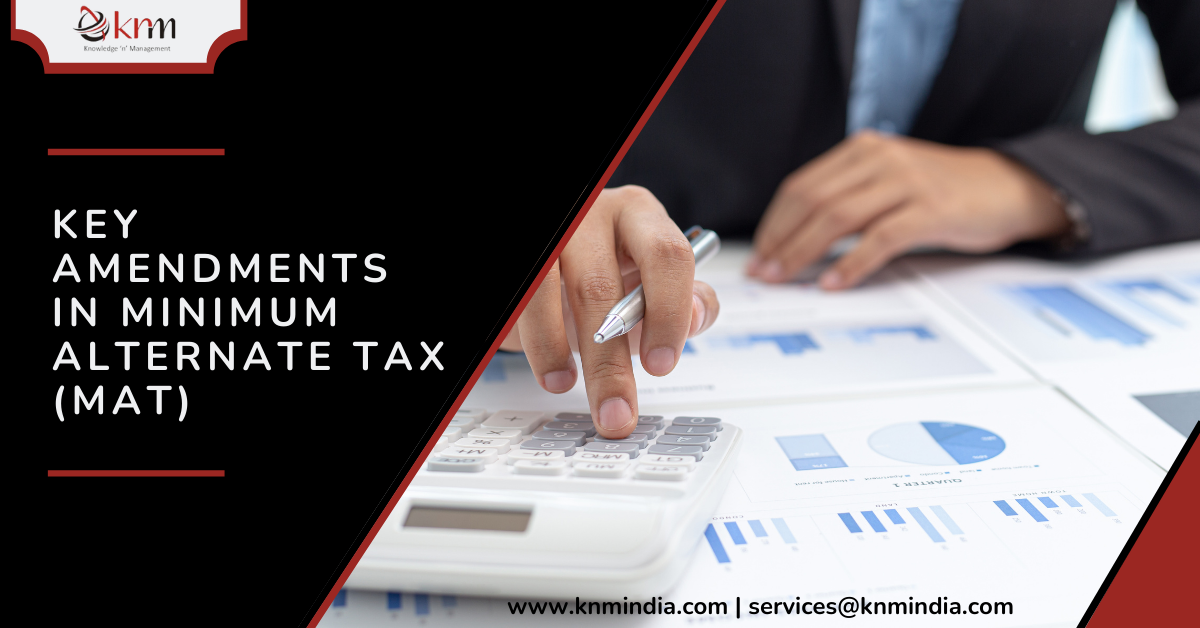A. Brief Background
MAT stands for Minimum Alternate Tax. MAT was introduced by the Finance Act, 1987 with effect from the assessment year 1988-89. Later on, it was withdrawn by the Finance Act, 1990, and then reintroduced by Finance (No. 2) Act, 1996, w.e.f 1-4-1997. The concept of MAT was introduced for companies and progressively it has been made applicable to all other taxpayers in the form of AMT. The objective of the introduction of MAT is to bring into the tax net “zero tax companies” which in spite of having earned substantial book profits and having paid dividends, do not pay any tax due to various tax concessions and incentives provided under the Income-tax Law.
B. Provision of Section 115JB
Presently every taxpayer being a company is liable to pay MAT, if the Income-tax (including surcharge and cess) payable on the total income, computed as per the provisions of the Income-tax Act in respect of any year is less than 15% of its book-profit + surcharge (SC) + health & education cess. Provisions of MAT are also applicable upon foreign companies subject to some relaxation given by Finance Act, 2016.
Amendments have been made in the provisions of MAT from time to time. We are hereby discussing some of the recent amendments made.
C. Amendment made by Finance Act, 2021
In section 115JB of the Income-tax Act, in sub-section (2), in Explanation 1, in clause (FB), in sub-clause (B), for the words “interest, royalty”, the words “interest, dividend, royalty” shall be substituted; and in clause (iid), in sub-clause (B), for the words “interest, royalty”, the words “interest, dividend, royalty” shall be substituted.
In order to provide similar treatment to a dividend as already there for capital gains on transfer of securities, interest, royalty, and Fee for Technical Services (FTS) in calculating book profit for the purposes of section 115JB of the Act, so that both specified dividend income and the expense claimed in respect thereof are reduced and added back, while computing book profit in case of foreign companies where such income is taxed at lower than MAT rate due to DTAA.
Remarks
Section 115JB does not differentiate between a domestic company and a foreign company for payment of MAT. But for computing book profit a company, it needs to prepare the statement of profit and loss as per Schedule III of the Companies Act, 2013. However, a foreign company will be governed by the provisions of the Companies Act, 2013 only when it has a place of business in India. So, MAT provisions will be applicable in the case of a foreign company only when it has a place of business in India or Permanent Establishment (PE).
Due to the abolishment of dividend distribution tax (DDT) with effect from Assessment Year 2021-22, the dividend income is chargeable to tax in the hands of the shareholders. So, a tax upon the dividend income has been shifted from a domestic company to shareholders, a foreign company shall become liable to pay tax in India on such dividend income under the normal provision as well as provision of MAT.
As per the amendment by the Finance Act, 2021, dividend income of a foreign company and expenses claimed in respect thereof shall not form part of the book profit and consequently, no MAT shall be levied thereon if the following conditions are satisfied:
(a) Dividend income is chargeable to tax at the rate specified under Chapter-XII; and
(b) The tax rate on such income as per the provisions of the Act is less than the rate of MAT.
In summarize, dividend incomes and expenses related to that income claimed in respect thereof shall be reduced from or added back while computing the book profit of a foreign company if the same is credited or debited in the statement of profit and loss, respectively. This adjustment is made if the relevant income is taxable at a rate lower than the rate of MAT.
D. Amendment made by Finance Act, 2020 (W.e.f AY 2021-22)
Provisions of MAT was being amended to provide that in cases where past year income is included in books of account during the previous year on account of an APA (Advance Pricing Agreement) or a secondary adjustment, the Assessing Officer shall on an application made to him in this behalf by the assesses, recompute the book profit of the past year(s) and tax payable, if any, during the previous year, in the prescribed manner. Further, the provisions related to rectification of mistake under section 154 of the Act shall apply so far as possible and the period of four years shall be taken from the end of the financial year in which the application is received by the Assessing Officer.
However, the benefit of this provision shall apply only if the assessee has not utilized the MAT Credit in any subsequent assessment year under section 115JAA.
E. Amendment through the Taxation (Amendment) Ordinance 2019:-
In section 115JB of the Income-tax Act, with effect from the 1st day of April 2020,
(a) in sub-section (1), the following proviso shall be inserted, namely:
“Provided that for the previous year relevant to the assessment year commencing on or after the 1st day of April 2020, the provisions of this subsection shall have effect as if for the words “eighteen and one-half percent.”, occurring at both the places, the words “fifteen percent.” had been substituted.”;
(b) for sub-section (5A), the following sub-section shall be substituted, namely:
“(5A) The provisions of this section shall not apply to,
(i) any income accruing or arising to a company from life insurance business referred to in section 115B;
(ii) a person who has exercised the option referred to under section 115BAA or section 115BAB.”.
Remarks
The tax rate of MAT was being decreased from 18.5% to 15% in order to give some relaxation to companies.
The Ordinance specifies that the provision MAT is not applicable to the following companies:
- The domestic companies which have opted for tax regimes under Section 115BAA or Section 115BAB.
- Any income accruing or arising to a company from the life insurance business referred to in Section 115B.
F. Amendment in MAT Credit from A.Y 2018-19:
Where the amount of Foreign Tax Credit (‘FTC’) allowed against the MAT exceeds the amount of such FTC admissible against the tax payable by the assessee under normal provisions of the Income-Tax Act, then, while computing the amount of FTC under this subsection, such excess amount shall be ignored.
Remarks
Amendment was being made in order to avoid the claim of ‘FTC’ twice, first, directly upon the payment of taxes when being paid under MAT and second, indirectly by taking MAT Credit against future tax liabilities.
The article has been contributed by
FCA Sunny Khanna
Sr. Manager-Audit
Further, we shall be happy to assist in case of any clarifications. For a deeper discussion, feel free to revert us at services@knmindia.com
Disclaimer: Information in this note is intended to provide only a general update of the subjects covered. It is not intended to be a substitute for detailed research or the exercise of professional judgment. KNM accepts no responsibility for loss arising from any action taken or not taken by anyone using this publication.



